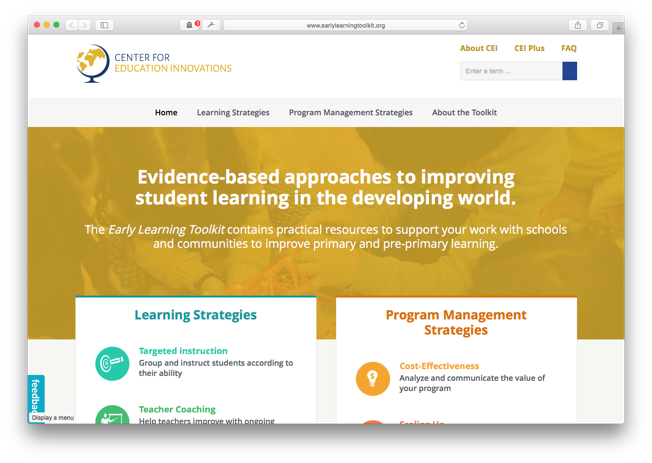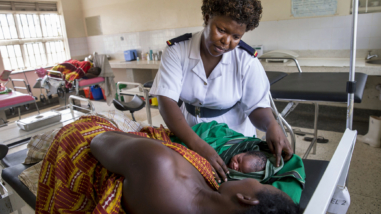Nicholas Burnett has been Managing Director for Global Education at Results for Development since 2010 and now also chairs IIEP’s Governing Board. He was previously UNESCO Assistant-Director for Education, Director of the Education for All Global Monitoring Report, and a World Bank human development manager. A version of this post appeared on the Center for Education Innovations blog earlier this week. -Ed.
Between 2006 and 2014 the Hewlett Foundation, with co-funding from the Gates Foundation, undertook an eight-year initiative to improve Quality Education in Developing Countries. In the post below, Nicholas Burnett, a member of the advisory panel for the initiative, reflects on the gains made through is grantmaking strategy. He also shares more about the Early Learning Toolkit, which takes evidence about how to improve early-grade literacy and numeracy that was gathered through work funded by the initiative and more broadly and translates it into actionable lessons and tools for practitioners, policymakers, donors, advocates, and researchers. The launch of the Toolkit this week is a first step. Comments and engagement will improve it over time, as Nicholas underscores in his post. -Dana Schmidt, Hewlett Foudation Program Officer
After 50 years, it is time to listen—or listen again—to C. E. Beeby, the pioneering educationalist who changed the face of New Zealand education, before turning his attention to the developing world.
When I became UNESCO’s Assistant Director-General for Education in 2007, I sat down and read as many of my predecessors’ publications as I could; I don’t think any other former ADG will be offended if I say that Beeby seemed the most useful for the then central UNESCO priority of Education for All. Beeby was certain of two things: “more attention must be given to the quality of education in developing countries, and there must be closer professional cooperation between the educator and the economist in educational planning.” That’s certainly what I think – and what I have tried to practice.
Beeby’s Quality Education in Developing Countries, published in 1966, called for a balance between planning for educational quantity while focusing also on educational quality. It also called for educators to apply the findings of research. Beeby was clear that we need to think about quality at three levels:
- The classroom: how to improve student learning
- The labor market: whether those leaving education have the right skills in the right numbers to meet employers’ needs, as measured by their productivity.
- Society as a whole: whether the education system supports the values and goals that society sets for itself.
Having established this, he then devoted his book to quality in the classroom, the critical first level. Alas, even 50 years later, we in the international education community have focused too much on the labor market and society broadly, to the relative exclusion of the fundamental classroom level.
I’m sure it’s no accident that the Hewlett Foundation’s path-breaking Quality Education in Developing Countries (QEDC) initiative had the same title as Beeby’s book. The Hewlett Foundation’s first Education Program Officer, Ward Heneveld, knew and admired Beeby and, indeed, is currently trying to get Beeby’s book republished. (If you are interested, Ward and others will be discussing Beeby’s work and its current relevance during the meeting of the Comparative and International Education Society in Vancouver in March.)
I myself am proud to have been associated with the QEDC initiative, as a long-serving member of its advisory panel beginning when I was at UNESCO and especially today, as R4D’s Center for Education Innovations launches the Early Learning Toolkit based on QEDC’s findings. The QEDC initiative has changed the way that the international community thinks about basic education. While complete attribution is, of course, impossible, I don’t have any doubt that QEDC’s focus on primary school learning (or rather, the lack of learning) as early as 2006 helped lead to the broad attention the learning crisis now gets, most visibly through learning now taking center-stage in the Sustainable Development Goal on Education and also through other initiatives such as those focused on early grade reading and numeracy.
Now that the goals have changed, practices have to follow. Teaching has to change if learning is to occur. That won’t be easy, as the education profession is profoundly conservative and stuck in its ways—Beeby provides a profound analysis of the reasons for this. We’ve built the Early Learning Toolkit to help support such change, to bring evidence-based resources to those who are working every day to improve learning. The Toolkit draws on all the evidence that the QEDC initiative accumulated, through its own evaluations and through Patrick McEwan’s meta-review of learning interventions, along with other more recent evidence and reviews.
I am confident that the Toolkit can help to change classroom teaching, by focusing on the ABCs of learning that Hewlett has identified through evaluations of the programs it supported:
“Aim at student’s ability levels;
Build structured lessons with accompanying materials; and
Communicate in a language that students understand.”
In assembling the Toolkit we used many media, including video, to provide actionable tools and knowledge, implementation tips, case studies of successful approaches, and the like. We also present not only learning strategies, like teacher coaching and parent-child interaction, but also program management strategies, like cost effectiveness and scaling up. Beeby would surely approve of this mix of the educators’ and the economists’ approaches.
This is a first go at the Toolkit. Take a look at it. Tell us what you like. Tell us (politely, please!) what you don’t like. Tell us how to improve it. Tell us of techniques and of evidence that we have not captured. The Toolkit is for you, the education practitioners. It can only be as good as you help us make it. And tell us what you think Beeby might have suggested too. I am sure he would have liked it as it is evidence and research-based; I am equally sure he would have had constructive suggestions to improve it.
*For more information, or to provide feedback on the Early Learning Toolkit, contact Molly Jamieson Eberhardt, Senior Program Officer, Results for Development Institute (R4D).



